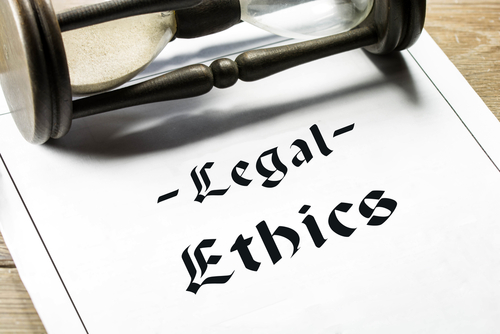Judge faces ethics charges for Facebook post defending cop who said accused spa shooter had 'a really bad day'

Image from Shutterstock.
A judge in Cherokee County, Georgia, is facing ethics charges for defending a spokesperson for the sheriff’s office who said an accused spa shooter had “a really bad day.”
The Atlanta Journal-Constitution has the story on the ethics charges filed against Judge David Cannon, who commented on Facebook and posted a transcript of the March 17 press conference in which Capt. Jay Baker made the much-criticized remark.
At the press conference, Baker said accused shooter Robert Aaron Long was “pretty much fed up and kind of at the end of his rope. Yesterday was a really bad day for him, and this is what he did.”
Long pleaded guilty to four of the eight Atlanta-area slayings in Cherokee County on Tuesday and still faces charges in another county, according to the New York Times.
Cannon said in his Facebook post he thought Baker was giving the perspective of the accused gunman.
“I believe he was summarizing what he was told by the investigators that interviewed the accused from the accused perspective,” Cannon wrote. “And Jay was not saying from Jay’s perspective that the accused had a bad day. Feel free to disagree, but read the transcript first!”
When someone commented that Baker should not have made the statement, Cannon responded.
“As a judge I don’t like them tainting the jury pool about a confession that may or may not be admissible depending on the circumstances,” he said. “So I’d rather them just say ‘we caught him.’”
The Georgia Judicial Qualifications Commission said in a complaint filed with the Georgia Supreme Court last week Cannon had wrongly commented on a pending case in a court on which he serves, according to the Atlanta Journal-Constitution.
Although Cannon was not assigned the case, he had told the commission that it was possible that he would be asked to sign warrants in the case.
Cannon said he felt the need to respond because law enforcement was being perceived as a “joke.”
The commission said Cannon did not act in a manner that promoted public confidence in the judiciary and lent the prestige of his office to advance the private interests of others.
Cannon’s lawyer, Lester Tate, told the Atlanta Journal-Constitution that he hopes that a satisfactory resolution can be reached. But he pointed to a 2002 U.S. Supreme Court decision that came down on the side of free speech when it struck down an ethics rule that barred judicial candidates from commenting on disputed legal or political issues.
“Judge Cannon did not surrender his First Amendment rights when he became a judge,” Tate said. “What they’re trying to do here is stitch together other provisions from the code of judicial conduct to infringe upon a judge’s free speech rights. I don’t think they can do that.”
Seventh paragraph corrected at 8:25 p.m.



